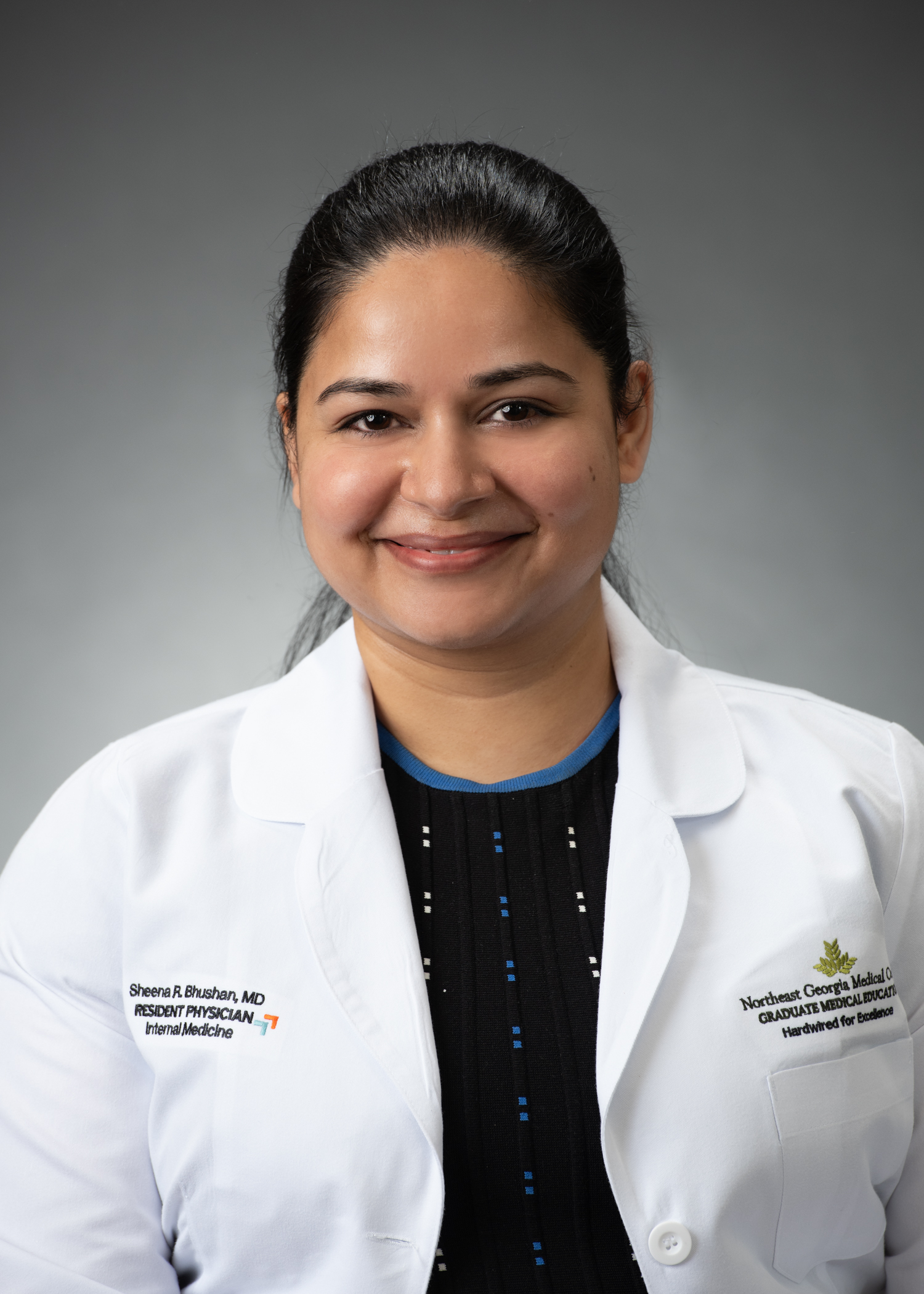By Dheeraj Chilamakrui, MHA
**Dr. Sheena Bhushan was named “Most Promising Intern Researcher” at the 2021-22 academic year Awards Banquet**
Please introduce us to your childhood and family!
I was born in California in a typical modern Punjabi-Indian family, where there was a lot of emphasis on academics and community service. Growing up, I wanted to be a human rights lawyer but ended up choosing medicine. I had a very happy childhood, my parents were/are very supportive, open-minded, and loving. I am the family’s middle child and was often the mediator in inter-sibling conflicts.
As someone who went to medical school in a different country, how was the journey to get into a US residency program?
Residency is quite competitive, more so if you are a foreign graduate. Foreign graduates often require additional research and clinical experience in the United States. During medical school, I completed clinical rotations in cardiology, infectious diseases, and rheumatology to gain experience in the specialties. After graduating from medical school, I completed a research year in gastroenterology and a global health fellowship before applying.
What do you do when you are not in the hospital?
Residency can be grueling, and I like to unwind whenever I get the chance. I love trying new restaurants, going to art shows/museums, reading, doodling and long drives. I love doing that with my closest friends here (you all know who you are). I also enjoy cooking and stargazing but haven’t been able to do much of that lately.
Tell us which specialty you want to become a physician-researcher in, and why the interest?
I am planning a career in gastroenterology (GI). Early cancer detection and prevention interests me the most. I am also very passionate about public health and improving our overall preventative approach to healthcare. Early cancer detection can mean the difference between an outpatient procedure, radiation/chemotherapy, life-changing surgery and even death. A career in GI would be a good balance between clinical practice, procedures, research, preventative and public health.
Tell us about your introduction to research; what motivates you to develop all the different research ideas?
I have been incredibly lucky to have worked with some of the most extraordinary minds in research and healthcare at a very young age. I was introduced to research in medical school, and to be honest, I thought it was something that was necessary but quite boring. It wasn’t until my time at Baylor College of Medicine in Houston that I truly started to appreciate it. What was initially meant to be a three to six month project turned into a full-fledged fellowship, during which I had the opportunity to work with Mac Arthur fellows, international clinician-physicians, global health advocates, and travel around the globe. I also worked locally in Houston to augment the city’s response to the Covid-19 pandemic.
I cannot pinpoint what motivates me to develop research ideas, but I think it may be my personality? I can be a perfectionist, so I find it easy to identify gaps in current practices. But I am also okay with being a beginner, having my ideas rejected, use feedback to improve until they are ready for implementation. Finally, research begets research – once you have a solid initial question, the following research question will usually present itself.
Can you tell us about any cool research projects you are currently working on?
I am working on a few projects here at NGMC. The first one focuses on identifying barriers to colorectal cancer screening in rural Georgia and historically underserved populations, including immigrants, women, and refugees. Similar studies in the US have focused on low-income neighborhoods in cities like NYC. No similar studies have been carried out in our community. The idea is to establish the prevalence of up-to-date colorectal cancer screening rates in our population, identify barriers and recommend interventions accordingly.
The second project focuses on pancreatic cancer, which usually is associated with a dismal prognosis. Nationally there is an underutilization of maximal therapy, which has shown to improve survival rates in early-stage pancreatic adenocarcinoma. The stage at which pancreatic cancer patients are referred to palliative care varies. My project again focuses on studying these trends.
I am also interested in preventative medicine and lifestyle disease and am working with our obesity clinic on developing a few ideas, and hopefully a clinical trial!
To learn more, visit https://www.ngmcgme.org/programs/internal-medicine/

